The legal and institutional framework in Serbia regarding the rights and needs of civilian victims of war
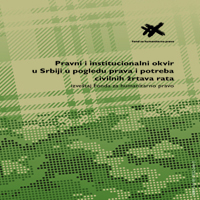
A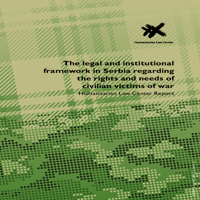 rmed conflicts in the territories of the former Yugoslavia lasted from 1991 to 2001. The wars in Croatia (1991-1995), Bosnia and Herzegovina (1992-1995) and Kosovo (1998-1999) resulted in the mass murders of civilians, ethnic cleansing and persecution of hundreds of thousands of people, but also a large number of grave crimes unseen in Europe since World War II. Serbia had an active and involved role in these conflicts. In the context of the armed conflicts, the authorities in Serbia during this entire period were responsible for serious violations of the fundamental rights of its own citizens from the ranks of national minorities, as well as of some members of the majority Serbian population. In Serbia today there are a significant number of citizens who came to Serbia as refugees owing to the wars in other countries of the former Yugoslavia, and most of them have remained in Serbia permanently. Among them are a fair number who survived crimes, whose physical and psychological consequences they suffer to this day, as well as many of those who lost one or more family members in the war.
rmed conflicts in the territories of the former Yugoslavia lasted from 1991 to 2001. The wars in Croatia (1991-1995), Bosnia and Herzegovina (1992-1995) and Kosovo (1998-1999) resulted in the mass murders of civilians, ethnic cleansing and persecution of hundreds of thousands of people, but also a large number of grave crimes unseen in Europe since World War II. Serbia had an active and involved role in these conflicts. In the context of the armed conflicts, the authorities in Serbia during this entire period were responsible for serious violations of the fundamental rights of its own citizens from the ranks of national minorities, as well as of some members of the majority Serbian population. In Serbia today there are a significant number of citizens who came to Serbia as refugees owing to the wars in other countries of the former Yugoslavia, and most of them have remained in Serbia permanently. Among them are a fair number who survived crimes, whose physical and psychological consequences they suffer to this day, as well as many of those who lost one or more family members in the war.






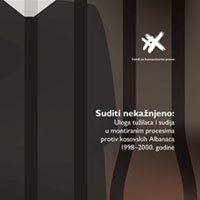
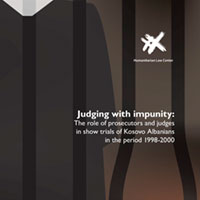 Around the end of 1996 and the beginning of 1997, the offices of district public prosecutors began indicting Kosovo Albanians en masse, pursuant to Article 125 of the CCY (with reference to terrorism) and Article 136, paragraphs 1 and 2 of the CCY (with reference to association for the purpose of conducting hostile activities). The trials for the above-cited charges were conducted by district courts in Kosovo during 1998 and 1999, more specifically until 9 June 1999 when the Kumanovo Agreement was signed and the army and police began their withdrawal from the territory of Kosovo.
Around the end of 1996 and the beginning of 1997, the offices of district public prosecutors began indicting Kosovo Albanians en masse, pursuant to Article 125 of the CCY (with reference to terrorism) and Article 136, paragraphs 1 and 2 of the CCY (with reference to association for the purpose of conducting hostile activities). The trials for the above-cited charges were conducted by district courts in Kosovo during 1998 and 1999, more specifically until 9 June 1999 when the Kumanovo Agreement was signed and the army and police began their withdrawal from the territory of Kosovo. 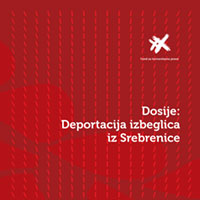
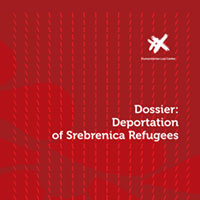 After the fall of Srebrenica on 11 July, 1995, an estimated 7,905 persons disappeared, mostly men considered by the Army of Republika Srpska as “able-bodied”. DNA analysis of the mortal remains of those found in mass graves, to date, has enabled positive identification of 5,977 persons killed in Srebrenica.
After the fall of Srebrenica on 11 July, 1995, an estimated 7,905 persons disappeared, mostly men considered by the Army of Republika Srpska as “able-bodied”. DNA analysis of the mortal remains of those found in mass graves, to date, has enabled positive identification of 5,977 persons killed in Srebrenica.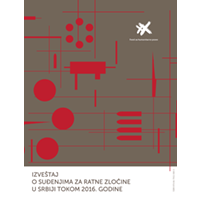
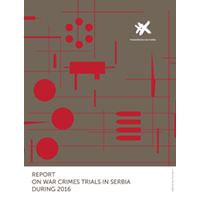 The Humanitarian Law Center (HLC) has monitored all war crimes trials conducted in the territory of Serbia in 2016 – that is to say, a total of 26 trials conducted by the War Crimes Departments of the Higher Court or the Court of Appeal in Belgrade, or the courts of general jurisdiction.
The Humanitarian Law Center (HLC) has monitored all war crimes trials conducted in the territory of Serbia in 2016 – that is to say, a total of 26 trials conducted by the War Crimes Departments of the Higher Court or the Court of Appeal in Belgrade, or the courts of general jurisdiction.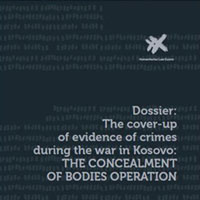
 Since 2001, mass graves containing the bodies of 941 Kosovo Albanians, mainly civilians killed outside combat situations in Kosovo during 1999, have been found on four locations in Serbia. 744 bodies of Kosovo Albanians have been discovered in Batajnica, on the outskirts of Belgrade, at least 61 in Petrovo Selo, and 84 at Lake Perućac. At least 52 bodies have been subsequently found in the mass grave at Rudnica.
Since 2001, mass graves containing the bodies of 941 Kosovo Albanians, mainly civilians killed outside combat situations in Kosovo during 1999, have been found on four locations in Serbia. 744 bodies of Kosovo Albanians have been discovered in Batajnica, on the outskirts of Belgrade, at least 61 in Petrovo Selo, and 84 at Lake Perućac. At least 52 bodies have been subsequently found in the mass grave at Rudnica. 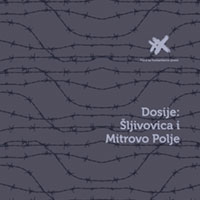
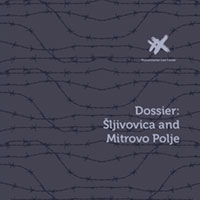 After capturing Žepa in late July 1995 approximately 800 Bosniaks from Žepa crossed the River Drina and entered the territory of the Republic of Serbia, frightened for their lives after rumours had spread of the crimes committed by the Army of Republika Srpska in Srebrenica. Most of them were members of the Army of BiH, but there were also civilians, including dozens of underage boys. Almost immediately after crossing, the men were taken captive by border guards of the Yugoslav Army and members of Special Police Units.
After capturing Žepa in late July 1995 approximately 800 Bosniaks from Žepa crossed the River Drina and entered the territory of the Republic of Serbia, frightened for their lives after rumours had spread of the crimes committed by the Army of Republika Srpska in Srebrenica. Most of them were members of the Army of BiH, but there were also civilians, including dozens of underage boys. Almost immediately after crossing, the men were taken captive by border guards of the Yugoslav Army and members of Special Police Units.
 The report by the Humanitarian Law Center (HLC) analyzes how are the existing mechanisms for public access to trials for war crimes applied and recommends necessary changes in the legislative framework and practice.
The report by the Humanitarian Law Center (HLC) analyzes how are the existing mechanisms for public access to trials for war crimes applied and recommends necessary changes in the legislative framework and practice. 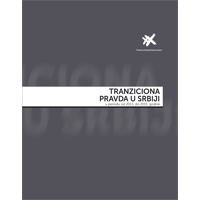
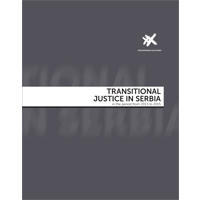 The aim of the report „Transitional Justice in Serbia in the period from 2013 to 2015“ is to inform the domestic and international publics on the progress of the process of establishing transitional justice in Serbia.
The aim of the report „Transitional Justice in Serbia in the period from 2013 to 2015“ is to inform the domestic and international publics on the progress of the process of establishing transitional justice in Serbia. 
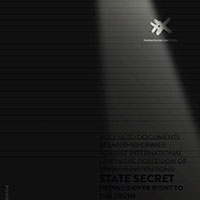
 Open access to archives which contain documents that can assist in determining the facts about past human rights violations is a key prerequisite for the establishment of transitional justice processes and mechanisms. In societies like the Serbian, which have experienced periods marked by systematic violence, access to information regarding human rights violations is an essential element of the right of victims and society as a whole to know the truth.
Open access to archives which contain documents that can assist in determining the facts about past human rights violations is a key prerequisite for the establishment of transitional justice processes and mechanisms. In societies like the Serbian, which have experienced periods marked by systematic violence, access to information regarding human rights violations is an essential element of the right of victims and society as a whole to know the truth.